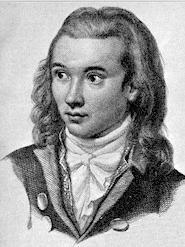1629 - 1693 Person Name: Chr. Scriver Hymnal Number: 378 Author of "Jesu, meiner Seele Leben" in Die Glaubensharfe Scriver, Christian, son of Christian Scriver (Schriver, Schreiber), merchant at Rendsburg in Holstein, was born at Rendsburg, Jan. 2, 1629; and was from his birth destined for the ministry. His father died of the plague, in 1629, but by the help of a rich great-uncle, he was able eventually to matriculate at the University of Rostock in Oct., 1647 (M.A., 1649). In 1650 he became tutor to a family at Segeberg, near Lübeck. While visiting a married half-sister at Stendal, he preached there with much acceptance, and was appointed, in 1653, archidiaconus of St. James's Church there. He then became, in 1667, pastor of St. James's Church at Magdeburg, where he was also appointed, in 1674, assessor at the consistory, in 1676 as Scholarch, in 1679 as Senior; and in 1685 had also the parishes and schools of the so-called Holzkreis placed under his inspection. At length he found his work too heavy, and, in 1690, accepted an invitation to Quedlinburg as consistorialrath and chief court preacher at the church of St. Servatius, and also as private chaplain to Anna Dorothea, Duchess of Saxony, and Abbess of the Lutheran Stift at Querllinburg. After a series of strokes of paralysis, he died at Quedlinburg, April 5, 1693 (Koch, iv. 78; Herzog's Real-Encyldo-pädie, xiv. p. 1, &c).
Scriver was a most popular, useful, and influential preacher; his earnestness being deepened by the memory of his many wonderful escapes from accident and pestilence. He was also the author of various devotional works, which found much acceptance, e.g. his Gottholds 300 Zufällige Andachte, Magdeburg, 1663 (1671, and later eds., have 400 Andachten: English version, as Gotthold's Emblems, by R. Menzies, D.D., Edinburgh, 1857); his Seelen-Schatz, in 5 parts 1675-92; and his Gotthold's Siech-und Sieges-Bette, in 2 parts, 1687-94.
It is difficult to say how many hymns Scriver wrote, apparently about ten. He refers to one or two in hisSeelenschatz and his Andachten, but does not give the full texts. A number are included, as by him, in C. Weise's abridgment of the Seelenschatz, which, was published at Wittenberg, in 1704, as the Seelenschatzes Kraft und Safft; and C. O. Weinschenk, pastor of St. Ulrich's in Magdeburg, in his Erbauliche Leben of Scriver (Magdeburg and Leipzig, 1729), gives a list of those he considers genuine.
Those of Scriver's hymns which have passed into English are:—
i. Auf, Seel, und danke deinem Herrn. Morning. Included, 1704, as above, and in 1729, also marked as by Scriver. But Scriver's son-in-law, Johann Heinrich Havecker …claims it as his own. Translated as, "To God, my Soul, Thank-offerings pay." By H. J. Bucholl, 1842, p. 30.
ii. Der lieben Sonne Licht und Pracht. Evening. This is Scriver's best hymn. Regarding it Lauxmann, in Koch, viii. 201, speaks thus:-—"Of the beautiful hymn of this true Teacher, the Chrysostom of our Lutheran church, in which the thoughts of Gerhardt's evening hymn ring and are powerfully re¬echoed ; st. vi.-viii., are of the greatest force, and of these especially st. viii." He also gives a portion of a sermon on Rogation Sunday, 1671, in which Scriver quotes st. viii. as expressing the deepest sentiments of his heart. Translated as:—
1. With Thee I lay me down to sleep. This is a translation of stanza v., vii., viii., as No. 481, in pt. i. of the Moravian Hymn Book, 1754. It is also found in the following forms:—
i. In peace I'll now lie down to sleep. In the Moravian Hymn Book, 1789.
ii. I lay me down with Thee to sleep. In Maurice's Choral Hymn Book, 1861.
iii. In peace will I lie down to sleep. In the Moravian Hymn Book, 1886.
2. My praise again I offer Thee. A tr. of st. iv., v., by A. T. Russell, as No. 6, in his Psalms & Hymns, 1851.
3. The lovely Sun has now fulfilled. This is a tr. of st. i., iv., v., ix., dated 1882, by M. W. Stryker, in his Hymns & Verses, 1883, p. 28, repeated in his Christian Chorals, 1885, No. 16. In his Song of Miriam, 1888, p. 26, it begins "The golden Sun has now fulfilled."
iii. Hier lieg ich nun mein Gott zu deinen Füssen. Repentance. Lent . The translation in common use is:—
Here, 0 my God, I cast me at Thy feet . This is a translation of st. i., iii., v., vi., x., xi., xxi., xxiii., xx vi., xxviii., by Miss Winkworth, in her Lyra Germanica, 1st Ser., 1855, p. 63. In her Chorale Book for England, 1863, No. 45, it begins, "Here, O my God, low at Thy feet I bend me;" is altered in metre; and omits the tr. of st. iii., 11. 3, 4; v.; vi., 11. 1, 2; and xxiv. [Rev. James Mearns, M.A.]
--Excerpts from John Julian, Dictionary of Hymnology (1907)
Christian Scriver


 My Starred Hymns
My Starred Hymns



